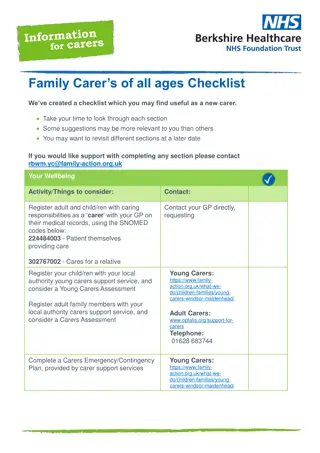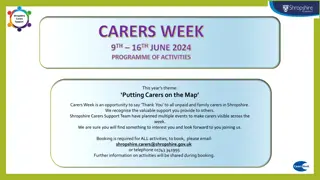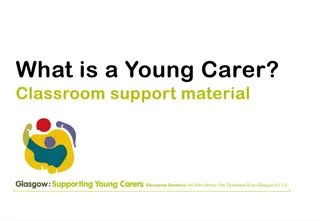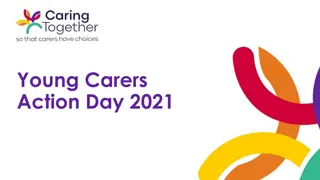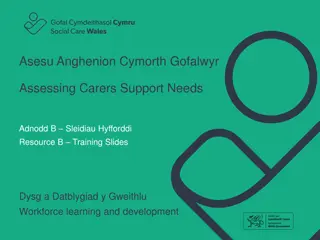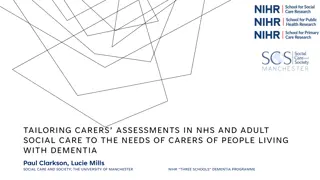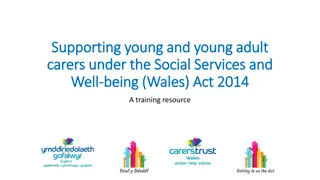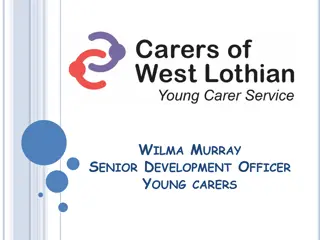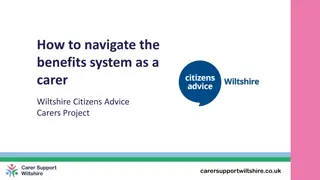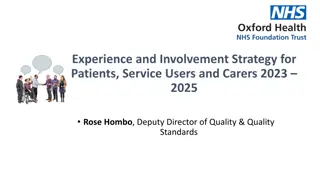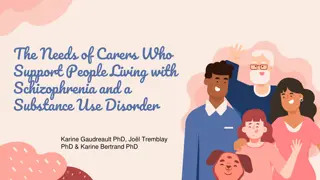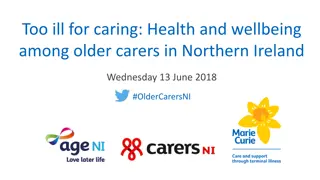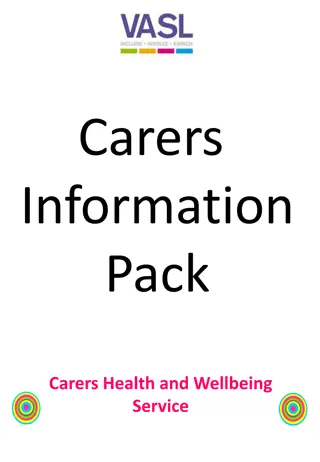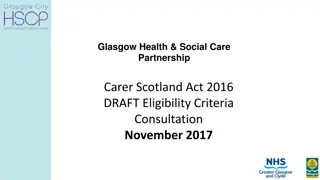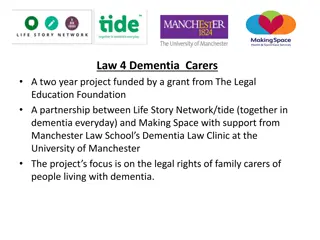Understanding Carers: Roles, Support, and Impact
Carers play a crucial role in society by providing unpaid care to family or friends who need assistance due to various reasons. This comprehensive guide explores who carers are, how they become carers, the support they need, and the impact of caring on their lives. It sheds light on the importance of recognizing and valuing carers' contributions, dispelling misconceptions, and highlighting the diverse backgrounds and experiences of carers.
Download Presentation

Please find below an Image/Link to download the presentation.
The content on the website is provided AS IS for your information and personal use only. It may not be sold, licensed, or shared on other websites without obtaining consent from the author. Download presentation by click this link. If you encounter any issues during the download, it is possible that the publisher has removed the file from their server.
E N D
Presentation Transcript
Carer Awareness In Partnership with Version 3 August 2020 1
Contents 1. Who is a Carer? 2. How do carers become carers? 3. The Age of Carers? 4. Why identify carers? 5. What do carers do? 6. Carers as Experts 7. The Impact of caring 8. Who might carers care for? 9. What is it like to be a Carer? 10. What do Carers Need? 11. Carers and the Law 12. Key contacts for carers Version 2 December 2019 2
This Information is designed to help you understand who carers are and what they do. You will learn about the support available for Carers in Plymouth including their legal rights and the types of support needs they may have. 3
A carer is anyone who cares, unpaid, for a friend or family member who due to illness, disability, a mental health problem or an addiction cannot cope without their support. (Carers Trust 2016) Carers fulfil a vitally important role in the community. But all too often in the past, their role hasn t been valued or recognised as it should be. So what makes a person a carer ? You may think that anyone who provides care to someone else is a carer. However, its not as straight forward as that and legally people need to meet certain criteria to be regarded as carers. 5
Carers may provide physical support and care or their role may primarily be about providing emotional support. Both of these are equally as important and can provide the basis of the need for a Carer's Assessment. Don t confuse carers with paid care workers (who are paid and work for a company that provides care at home) or volunteer befrienders (Who support people whilst volunteering for an organisation). The 2011 census recorded that 27,247 people in Plymouth identified themselves as carers. This number is increasing year on year. 6
Often the barrier to support for carers is that they do not see themselves as a carer - they feel they are just supporting someone close to them. Many carers don t call themselves a carer . They see themselves as someone s mum, dad, brother, sister, son, daughter, husband, wife, partner, relative or friend. They see caring as a natural part of their relationship with the person they care for. Every carer is different and carers come from all walks of life. Each carer builds a pattern of caring that reflects their cultural background, upbringing and individual lifestyle. It is important not to generalise about carers or stigmatise them. However, we do have national statistics and data from surveys to help build up a picture of carers in the UK. 7
There are around seven million carers in the UK that is one in ten people. This is rising. Three in five people will be carers at some point in their lives in the UK. Out of the UK's carers, 42% of carers are men and 58% are women. The economic value of the contribution made by carers in the UK is 132bn a year. By 2030, the number of carers will increase by 3.4 million (around 60%). Source Carers UK: https://www.carersuk.org/for-professionals/policy/policy- library/facts-about-carers-2019 8
How do carers become carers? 9
Many people who become carers were not expecting to do so. For example, John and Sarah were expecting to become parents. They were not necessarily expecting the extra caring responsibilities which they have because their sons have additional needs. Becoming a carer can happen suddenly. Tony became a carer when his wife was diagnosed with cancer. Simbad became a carer gradually as Tannika s mental health problems developed over a number of years. Caring can start at a young age Simon is 15 years old and has been caring for his dad since he was 5 years old. His dad has a neurological disorder and he relies on Simon to help him with his medication and meal preparation. 10
49 98 35 The Age of Carers? 24 56 63 17 27 44 81 77 11
Most Carers are of working age. People in their 50's are the most likely to have caring responsibilities. This is because disabled children are living longer (and are no longer in institutions but are encouraged to live independently) and we are an ageing society (so we may well have parents still alive who are in their 70's or 80's or older who require care). The 50's is also the age in which the risk of heart attacks, strokes etc starts to rise so these people may well require support from spouses, partners and friends. The loss of carers from the workforce means losing valuable experience and knowledge especially when those carers are in the age group that contributes most to the management structure of organisations (i.e. 45 - 64). 12
It is important to identify carers, and their families, so that they can be offered appropriate support. This helps carers to stay happy and healthy so that they are better able to carry on caring for as long as they want to. Identifying carers helps to reduce carers loneliness and isolation, carers poverty and housing problems, hospital admissions and NHS spending and carers mental ill health. Support for carers also benefits the whole family and the person who is being cared for. 14
Providing care can encompass a wide range of activities. Many carers provide physical help with things like getting in and out of bed, dressing, washing, assisting with medication, changing dressings and moving around. However, for others the caring role is primarily about providing emotional support and encouragement. While this tends to be less visible than physical care, it s often equally as important Sources: Carers UK Facts about carers, Carers UK In Sickness and in Health Report While around 60% of carers look after people with physical disabilities or sensory impairments, many care for people with other conditions: mental health difficulties, learning disabilities, illnesses like diabetes and HIV/Aids and problems caused by drugs or alcohol. 15
Most carers look after elderly people often their parents, parents in-law, neighbours or friends. In fact, its been estimated that around 70% of people being cared for are aged 65 or over. However it is important to remember that substantial numbers of carers look after younger people too. E.g. Disabled children who cannot manage without help and support. Carers may provide care from a few hours a week right through to 24 hours a day. The majority of carers provide more than 20 hours of care per week, while around a quarter provide more than 50 hours. To put this in perspective, most full-time jobs involve working less than 40 hours per week. 17
More than half of all carers have a long term health condition or illness. While nearly a third have a physical disability. 80 % of carers state that caring has had a negative impact on their physical and mental health. Many people are in mutually dependant care relationships, where they provide care to a partner or family member, while their partner or family member provides care to them. Sources: Carers UK Facts about carers, Carers UK In Sickness and in Health Report 18
Remember Anyone can be a carer - the carer might be under 18 (Even as young as 5), a parent, a relative or have health problems themselves. Carers are often very busy juggling other responsibilities alongside their caring; this could be working, school or having a young family. If you think that someone may be a carer over 18 caring for an adult refer them to the Caring for Carers for support within their caring role 19
If you think that someone may be a parent of a disabled child aged under 18, their child can be assessed by the local authority under law relating to the needs of children in the Children and Families Act 2014. They will also be assessed as part of that process because social services will look at the needs of the family as a whole. This is often referred to as a "holistic" assessment. They can contact Plymouth Gateway on 01752 668000 or email gateway@plymouth.gov.uk to request an assessment for their child and themselves as a parent carer 20
Young carers are children under 18 with caring responsibilities, and their rights to be assessed come mostly from the Children Act 1989 and the Children and Families Act 2014. If there is an adult being looked after, then Plymouth City Council has a duty to consider whether there are any children involved in providing care, and if so, what the impact is on that child. Plymouth City Council have a duty to assess on the appearance of need (i.e. without a request having to be made). They also have a more general duty to take reasonable steps to identify young carers. 21
The local council must involve the child with caring responsibilities, their parents and any other person the young carer requests in the assessment process. The assessment itself must look at whether or not the young carer wishes to continue caring, and whether it is appropriate for them to continue caring. When doing this they have to take into account any education, training, work or recreational activities the young carer is or wishes to participate in. Where a young carer s eligible needs are identified as requiring support, Plymouth City Council will have to: provide support directly to the young carer or demonstrate that the cared for person s assessment has provided adequate care and support to prevent inappropriate care being required from the young carer 22
If the young carer is about to reach the age of 18 years, they will also be able to get a 'transition assessment' which will let them know whether they are likely to be eligible for support as an adult caring for another adult. They can contact Plymouth Gateway on 01752 668000 or email gateway@plymouth.gov.uk to receive support. 23
Carers are often experts and know a lot about the person they care for. Whilst some services provide excellent support to carers, this is not always the case. Sometimes services and professionals concentrate on the needs of the person who is being cared for. They may not recognise the carer s needs, or involve them in the treatment and support of the person they care for. This can leave carers feeling ignored and unsupported. Mary: I often know exactly what Jim is trying to say. When the occupational therapist came to see us she listened to me and we helped work things out together to get the right help for Jim. 25
Working alongside carers and the people they care for means that: Support provided is more likely to be personalised, effective and sustainable. Carers are less likely to experience problems. Carers are more likely to be able to continue in their caring role, if they wish to do so. 26
Caring can make people physically exhausted. They might be getting up several times in the night as well as caring throughout the day. They might need to lift and support an adult who is a lot heavier than them. They might be juggling caring with looking after the rest of their family and holding down a job. Caring can leave people emotionally exhausted because of the strain of seeing someone they care about experiencing pain, distress or discomfort. Caring can lead to stress, depression and other mental health issues. Caring can affect your relationship with your partner or other family members. 28
If you are caring in a couple you may no longer be able to have the physical or emotional life you had together, nor enjoy shared activities or plan for a future together. Caring can be isolating as you may find you can rarely leave the house. It may be hard to sustain friendships or develop new ones or keep up with interests and activities you may have previously enjoyed. Caring can lead to poverty if you have to give up work to care or are managing on welfare benefits. The aids and equipment needed to help care can add an extra drain on tight finances. Carers in poverty will not be able to afford do the things that many of us take for granted, such as buying new or warm clothes, heating the house, house repairs, going on holiday or a short break, running a car or paying a bus fare. 29
Young carers can find it hard to go to school/college/university or keep up with course work. They can be bullied and find it difficult to make or keep friends. They can take on responsibilities well beyond their years and have little time for play or socialising or to be children or young people. Caring may mean that you have to put your chance of a career on hold or never have the opportunity to have a career and reach your full potential. Becoming a carer can feel like a constant battle to access help for you and the person you care for, for example getting the right diagnosis for your child s condition, appropriate support at school for a young carer in your family, adaptations to the home, and welfare benefits and other financial help. 30
Carers usually help to look after a family member who has an illness, a disability, and/or is affected by mental ill health and/or substance misuse. Carers can be any age carers under 18 are called young carers. Carers are not always related to the person they care for. Some people care for a friend or neighbour. As parents of a disabled child the person is referred to as a parent carer. As a Grandparent of a disabled child the person is referred to as a Grandparent carer Sometimes, people can have a reciprocal caring relationship this is called mutual caring and it means that both people care for each other. It is often the case for older couples. 32
The term 'sandwich generation' is often used to refer to those looking after young children at the same time as caring for older parents. It can also be used much more broadly to describe a variety of multiple caring responsibilities for people in different generations. A carer does not have to be the only person looking after someone. For example, two people can care for each other but another person can also care for both of them. Carers do not always live with the person they are helping to look after. 33
Carers support the people they care for in many ways. For example, they may help someone with personal care or practical tasks. They may also be a source of emotional support for someone. This might mean listening to someone s concerns and helping them with their motivation and mood. Carers often talk about the positive aspects of their caring role. For example, knowing they are making a difference to someone they love can be very rewarding. It can also be extremely fulfilling to see someone they care for make progress and achieve their goals. However, carers, the people they care for and their families can also face challenges and difficulties. 35
No two caring roles are the same and every carer will have different needs and issues to face. There are many ways caring could impact on someone's life and this could vary depending on the level of caring that they might be doing. These may include: Getting up to go to work may take longer. They may feel more stressed at work because of worrying about the person they look after. They may find that they have less time to do the things that they need to do. They may put their needs below that of the person that they look after. 36
They may feel positive about the fact that they are helping someone. They may need to change their daily, weekly, monthly and annual routines and activities. They may need to adjust their timetable to help someone take regular medication or to carry out personal care duties such as washing or supporting someone to eat their meals. They may need to organise appointments to medical specialists or day services. There may be things that they would decide they couldn't do (but is this what they would really want if they were given a choice?) 37
A carer needs: to be asked what would help them. access to Telecare and Reablement services to support them in their caring role. access to information to support them practically, emotionally and financially. to be listened to to have their confidentiality respected to still have a relationship with the person they care for 39
"Issues around confidentiality should not be used as a reason for not listening to carers, nor for not discussing fully with service users the need for carers to receive information so that they can continue to support them. Carers should be given sufficient information, in a way they can readily understand, to help them provide care efficiently. (Department of Health: November 2002) 40
Carers and the Law Please note that this is intended as a general overview of key aspects of the law for carers. It is not intended as an authoritative statement of the law. 41
Phase One of the Care Act 2014 came into force in April 2015. The Act simplifies legislation about care and support putting carers on an equal legal footing to those they care for and putting their needs at the centre of the legislation Promoting wellbeing is the underlying principle. In April 2015 The Care Act 2014 replaced most previous law regarding carers and people being cared for. It outlines the way in which local authorities should carry out carer s assessments and needs assessments; how local authorities or delegated organisations should determine who is eligible for support; how local authorities should charge for both residential care and community care; and places new obligations on local authorities. 42
Under Phase One local authorities have a number of duties including: To prevent, reduce or delay the need for support. To establish and maintain information and advice services. To provide a carer with an assessment (this can be delegated to another agency). To take a Whole Family approach. The Care Act is mainly for adults in need of care and support, and their adult carers. There are some provisions for the transition of children in need of care and support, parent carers of children in need of care and support, and young carers. However the main provisions for these groups (before transition) are in the Children and Families Act 2014 43
Carers and their rights is Carers UKs definitive guide to the legal rights of carers as they apply in England. Now in its sixth edition, the guide has been fully updated to reflect the new rights for carers as part of the Care Act 2014, the Children and Families Act 2014 and other relevant guidance and legislation. The 108 page guide is written by Professor Luke Clements, who is a solicitor and Professor of Law at the University of Leeds and was the Special Adviser to the Parliamentary Committee that scrutinised the draft Bill that resulted in the Care Act 2014. On 17th July 2015 the Government made a written statement to the House of Lords announcing its decision to delay the implementation of phase two of the Care Act 2014 (England only), which had been due to come into force in April 2016, until April 2020. 44
Other legislation that protects carers Equality Act 2010 If you are looking after someone who is elderly or disabled, the law will protect you against direct discrimination or harassment because of your caring responsibilities. For more information go to https://www.citizensadvice.org.uk/Documents/Advice%20booklets/ equality-act-2010-carer.pdf The Employment Act 2002 This gave the right to request flexible working to working parents of children under the age of six (or 18 if the child has special needs).From 6 April 2007 the government extended this right, so that it now also applies to employees who care for an adult. For more information go to https://www.gov.uk/flexible-working 45
Support for Carers in the SouthWest Support for Plymouth Adult Carers https://www.improvinglivesplymouth.org.uk/our- services/caring-for-carers Support for Plymouth Young Carers https://www.plymouthonlinedirectory.com/article/1815/Time- 4-U Plymouth online directory is a good source of information to find out what services are available to carers https://www.plymouthonlinedirectory.com/article/294/Registe r-as-a-carer Support for Carers in Devon https://devoncarers.org.uk/ 47
Support for Carers Cont.. Support for Carers in Torbay https://www.torbayandsouthdevon.nhs.uk/services/carers- service/ Support for Carers in Cornwall https://www.supportincornwall.org.uk/kb5/cornwall/directory /carers.page For Carers Services in other areas please use Carers UK search directory below: https://www.carersuk.org/help-and-advice/get-support/local- support 48
Useful Websites to support carers https://www.improvinglivesplymouth.org.uk/our- services/caring-for-carers/cfc-useful-websites 49



